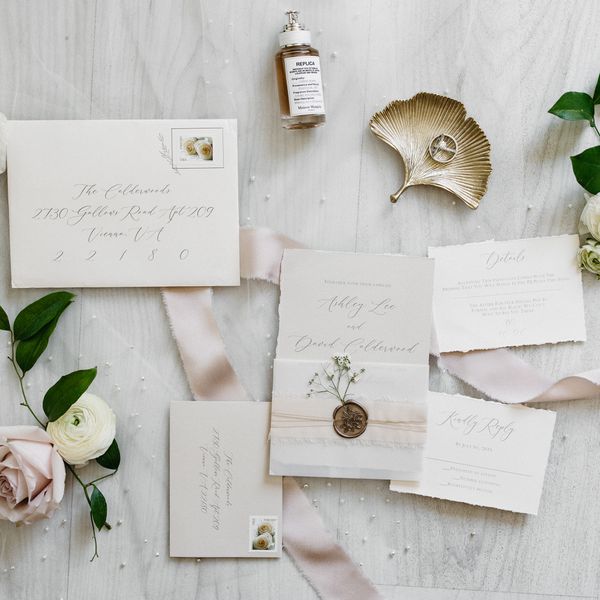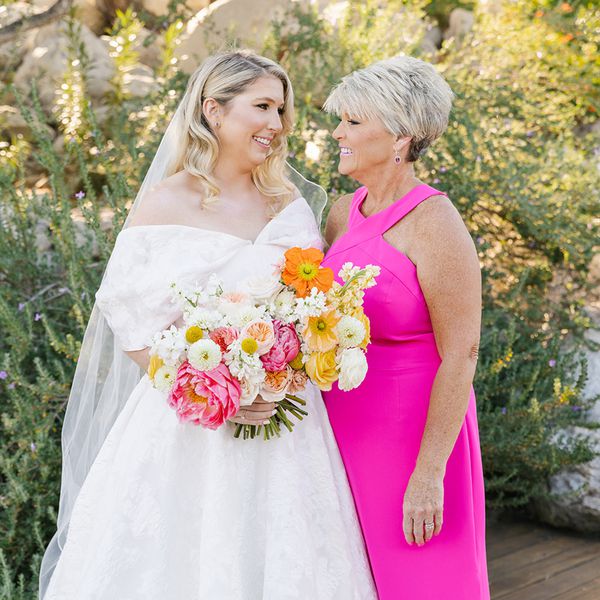:max_bytes(150000):strip_icc()/BRI-24Q2-AN-HowToBeThereDuringPlanning-Recirc-GettyImages-6ab58ade270d44b1bba42607978b03bf.jpg)
Getty Images
As a parent, you’re likely eager to find ways to support your child throughout the wedding planning process. Whether you’re helping them select the perfect dress or suit, accompanying them to their cake tasting, or assisting them with the final guest list, planning a wedding is just as memorable of an experience for you as it is for your son or daughter. But before you break out your spreadsheets and start giving floral suggestions, there are a few things to know about a parent’s role in helping out with the big day. Our first piece of advice? Never overstep the boundaries put in place by your child.
Though you’ve probably helped guide your son or daughter through life’s ups and downs, wedding planning requires a different level of support—which is entirely based on the individual needs of the engaged couple. While the advice and knowledge you’re willing to share can be helpful, it’s best to let your child steer the ship and dictate where and when they need your assistance, if at all. Etiquette expert Diane Gottsman further echoes this sentiment, revealing that she’s had to come to terms with supporting her own engaged daughter from the sidelines. “She has been able to do it on her own because she knows what she wants,” Gottsman shares. “It’s important as a parent to honor that when it fits the budget and it’s their wishes.”
Meet the Expert
- Diane Gottsman is an etiquette expert and owner of The Protocol School of Texas in San Antonio, Texas.
- Victoria Lartey-Williams is the owner of and the lead event planner and designer behind Victorious Events NYC, a boutique wedding planning and design firm.
And our advice doesn’t stop there. Ahead, we asked Gottsman, in addition to wedding planner Victoria Lartey-Williams, to share five additional rules parents should follow to best support their child while they plan their wedding. Here’s everything you need to know.
:max_bytes(150000):strip_icc()/BRI-24Q2-AN-HowToBeThereDuringPlanning-Embed-1-GettyImages-94362137249741e9af60047929fcc140.jpg)
Getty Images
Listen to and Respect Your Child's Wishes
According to Lartey-Williams, listening to your child and respecting their wishes is the best way to provide optimal support when wedding planning. This simple act shows your son or daughter that you understand and acknowledge their boundaries and trust that they’re capable of making the right decisions—which, in turn, can relieve any wedding planning stress they may have. “As a parent, I want to know everything. Do they have a date? What are the colors? What season?” Gottsman adds. “But we also want to honor their space and not put pressure on them.”
You don’t want to entirely ease off the gas, though, shares Lartey-Williams. “I feel like there's two different types of parents. There are the parents who are really involved, and there are the parents who take a back seat because they don't want to overstep,” she says. “Landing somewhere in the middle is the best way to be helpful to their children.” It may be hard to release the reins and let your child take the lead, but, ultimately, your role as a parent is to respect whatever your child needs and requests (within reason!) during the lead up to the big day.
Avoid Sharing Negative Opinions
Chances are you’re going to dislike a few decisions your son or daughter makes about their wedding. However, it’s best to keep things positive and avoid sharing any negative sentiments, especially if your child hasn’t requested anyone’s feedback. “One mistake parents make is trying to impose their views that may not align with the bride and groom,” Gottsman says. “You want to help them think through things without insisting that they follow your advice.” Lartey-Williams adds, “That can really overwhelm the couple and take away from their enjoyment of planning one of the best days of their life.”
Remember, your child is an adult and is fully capable of making independent decisions, even if you disagree with them. “What's most important is prioritizing your relationship with your child, first and foremost,” advises Lartey-Williams, who further shares that parents should leave the details to the couple and wedding planner so that they're able to provide optimal care and love throughout the planning process.
:max_bytes(150000):strip_icc()/BRI-24Q2-AN-HowToBeThereDuringPlanning-Embed-2-GettyImages-bddbd1a0a75b448aa64be1b20de66d6a.jpg)
Getty Images
Set Clear Expectations About Your Financial Contributions
If you plan to provide financial support and contribute to your child’s wedding day budget, be sure to clearly communicate how much you’re able to give them as soon as possible. It’s also imperative that you stick to your budget and only promise an amount you can actually deliver. “If the parents are helping with the budget, then the parents have a right to set a budget,” Gottsman adds. “Everything should be determined and communicated in advance.” With that in mind, money doesn’t dictate your level of involvement during wedding planning, so if you choose to pay for your child’s nuptials, you still have to respect their boundaries and follow their lead.
Stay in the Moment and Be Present
Wedding planning comes with many heartfelt junctures, and as the days inch closer to the main event, it's important that you enjoy each moment with your child to help cultivate a supportive space as nerves start to build up. Luckily, remaining present isn't a tall order: All you need to do is focus on the now and not put too much thought into how the wedding will turn out. Lartey-Williams also recommends scheduling time regularly to meet with your child and their partner (without discussing the wedding), in order to maintain a sense of normalcy as the final planning pieces come together. “Scheduling a lunch date or inviting them to dinner at [your] home will go a long way,” she adds. By staying grounded and level-headed, you'll be able to minimize any stress you may have otherwise transferred to your child unintentionally.
Be an Advocate
One final tip? Always advocate for your child, notes Gottsman. This means having difficult conversations with other family members and guests so that your daughter or son doesn't have to deal with any drama. For example, if your child plans to have a kid-free celebration, offer to speak with guests who are requesting to bring their children. “You’re playing the cheerleader and the balancer," Gottsman says. At the end of the day, you want to ensure your child has a stress-free experience, so being a buffer is a wonderful way to help cultivate a supportive space.
If you’re still unsure how to help your child, though, simply ask them, “How involved do you want me to be? I will do as much or as little as you would like. I just want you to know I'm here for you,” Gottsman recommends. “Although [wedding planning] is joyful, it's also stressful. To avoid any of that confusion, when in doubt, just ask.”















